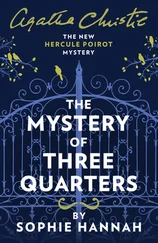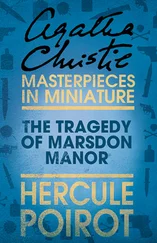Agatha Christie - Three Act Tragedy
Здесь есть возможность читать онлайн «Agatha Christie - Three Act Tragedy» весь текст электронной книги совершенно бесплатно (целиком полную версию без сокращений). В некоторых случаях можно слушать аудио, скачать через торрент в формате fb2 и присутствует краткое содержание. Жанр: Классический детектив, на английском языке. Описание произведения, (предисловие) а так же отзывы посетителей доступны на портале библиотеки ЛибКат.
- Название:Three Act Tragedy
- Автор:
- Жанр:
- Год:неизвестен
- ISBN:нет данных
- Рейтинг книги:4.5 / 5. Голосов: 2
-
Избранное:Добавить в избранное
- Отзывы:
-
Ваша оценка:
- 100
- 1
- 2
- 3
- 4
- 5
Three Act Tragedy: краткое содержание, описание и аннотация
Предлагаем к чтению аннотацию, описание, краткое содержание или предисловие (зависит от того, что написал сам автор книги «Three Act Tragedy»). Если вы не нашли необходимую информацию о книге — напишите в комментариях, мы постараемся отыскать её.
Three Act Tragedy — читать онлайн бесплатно полную книгу (весь текст) целиком
Ниже представлен текст книги, разбитый по страницам. Система сохранения места последней прочитанной страницы, позволяет с удобством читать онлайн бесплатно книгу «Three Act Tragedy», без необходимости каждый раз заново искать на чём Вы остановились. Поставьте закладку, и сможете в любой момент перейти на страницу, на которой закончили чтение.
Интервал:
Закладка:
“Yes, since ten o’clock they’ve been here.”
“The police?” said Hercule Poirot.
“Perhaps we could see Mrs. de Rushbridger now,” suggested Mr. Satterthwaite. “Since she asked us to come – ”
The Matron interrupted him.
“Oh, Mr. Satterthwaite, then you don’t know!”
“Know what?” demanded Poirot sharply.
“Poor Mrs. de Rushbridger. She’s dead.”
“Dead?” cried Poirot. “ Mille tonnerres! That explains it. Yes, that explains it. I should have seen – ” He broke off. “How did she die?”
“It’s most mysterious. A box of chocolates came for her – liqueur chocolates – by post. She ate one – it must have tasted horrible, but she was taken by surprise, I suppose, and she swallowed it. One doesn’t like spitting a thing out.”
“ Oui, oui, and if a liquid runs suddenly down your throat, it is difficult.”
“So she swallowed it and called out and Nurse came rushing, but we couldn’t do anything. She died in about two minutes. Then doctor sent for the police, and they came and examined the chocolates. And the top layer had been tampered with, the underneath ones were all right.”
“And the poison employed?”
“They think it’s nicotine.”
“Yes,” said Poirot. “Again nicotine. What a stroke! What an audacious stroke!”
“We are too late,” said Mr. Satterthwaite. “We shall never know now what she had to tell us. Unless – unless – she confided in someone?” He glanced interrogatively at the Matron.
Poirot shook his head.
“There will have been no confidences, you will find.”
“We can ask,” said Mr. Satterthwaite. “One of the nurses, perhaps?”
“By all means ask,” said Poirot; but he did not sound hopeful.
Mr. Satterthwaite turned to the Matron who immediately sent for the two nurses, on day and night duty respectively, who had been in attendance on Mrs. de Rushbridger, but neither of them could add any information to that already given. Mrs. de Rushbridger had never mentioned Sir Bartholomew’s death, and they did not even know of the despatching of the telegram.
On a request from Poirot, the two men were taken to the dead woman’s room. They found Superintendent Crossfield in charge, and Mr. Satterthwaite introduced him to Poirot.
Then the two men moved over to the bed and stood looking down on the dead woman. She was about forty, dark-haired and pale. Her face was not peaceful – it still showed the agony of her death.
Mr. Satterthwaite said slowly:
“Poor soul… ”
He looked across at Hercule Poirot. There was a strange expression on the little Belgian’s face.
Something about it made Mr. Satterthwaite shiver…
Mr. Satterthwaite said:
“Someone knew she was going to speak, and killed her… She was killed in order to prevent her speaking… ”
Poirot nodded.
“Yes, that is so.”
“She was murdered to prevent her telling us what she knew.”
“Or what she did not know… But let us not waste time… There is much to be done. There must be no more deaths. We must see to that.”
Mr. Satterthwaite asked curiously:
“Does this fit in with your idea of the murderer’s identity?”
“Yes, it fits… But I realise one thing: The murderer is more dangerous than I thought… We must be careful.”
Superintendent Crossfield followed them out of the room and learnt from them of the telegram which had been received by them. The telegram had been handed it at Melfort Post Office, and on inquiry there it was elicited that it had been handed in by a small boy. The young lady in charge remembered it, because the message had excited her very much, mentioning, as it did, Sir Bartholomew Strange’s death.
After six o’clock that evening the small boy who had handed in the telegram was found. He told his story promptly. He had been given the telegram by a man dressed in shabby clothes. The man told him that the telegram had been given him by a “loony lady” in the “House in the Park.” She had dropped it out of the window wrapped round two half-crowns. The man was afraid to be mixed up in some funny business, and was tramping in the other direction, so he had given the boy two and six and told him to keep the change.
A search would be instituted for the man. In the meantime there seemed nothing more to be done, and Poirot and Mr. Satterthwaite returned to London.
It was close on midnight when the two men arrived back in town. Egg had gone back to her mother, but Sir Charles met them, and the three men discussed the situation.
“ Mon ami ,” said Poirot, “be guided by me. Only one thing will solve this case – the little grey cells of the brain. To rush up and down England, to hope that this person and that will tell us what we want to know – all such methods are amateurish and absurd. The truth can only be seen from within.”
Sir Charles looked slightly sceptical.
“What do you want to do, then?”
“I want to think. I ask of you twenty-four house – in which to think.”
Sir Charles shook his head with a slight smile.
“Will thinking tell you what it was this woman could have said if she lived?”
“I believe so.”
“It hardly seems possible. However, M. Poirot, you must have it your own way. If you can see through this mystery, it’s more than I can. I’m beaten, and I confess it. In any case, I’ve other fish to fry.”
Perhaps he hoped to be questioned, but if so his expectation was disappointed. Mr. Satterthwaite did indeed look up alertly, but Poirot remained lost in thought.
“Well, I must be off,” said the actor. “Oh, just one thing. I’m rather worried about – Miss Wills.”
“What about her?”
“She’s gone.”
Poirot stared at him.
“Gone? Gone where?”
“Nobody knows… I was thinking things over after I got your telegram. As I told you at the time, I felt convinced that that woman knew something she hadn’t told us. I thought I’d have a last shot at getting it out of her. I drove out to her house – it was about half-past nine when I got there – and asked for her. It appears she left home this morning – went up to London for the day – that’s what she said. Her people got a telegram in the evening saying she wasn’t returning for a day or so and not to worry.”
“And were they worrying?”
“I gather they were, rather. You see, she hadn’t taken any luggage with her.”
“Odd,” murmured Poirot.
“I know. It seems as though – I don’t know. I feel uneasy.”
“I warned her,” said Poirot. “I warned everyone. You remember I said to them, ‘Speak now.’”
“Yes, yes. Do you think that she, too -?”
“I have my ideas,” said Poirot. “For the moment I prefer not to discuss them.”
“Fist, the butler – Ellis – then Miss Wills. Where is Ellis? It’s incredible that the police have never been able to lay hands on him.”
“They have not looked for his body in the right place,” said Poirot.
“Then you agree with Egg. You think he is dead?”
“Ellis will never be seen alive again.”
“My God,” burst out Sir Charles. “It’s a nightmare – the whole thing is utterly incomprehensible.”
“No, no. It is sane and logical, on the contrary.”
Sir Charles stared at him.
“You say that?”
“Certainly. You see, I have the orderly mind.”
“I don’t understand you.”
Mr. Satterthwaite, too, looked curiously at the little detective.
“What kind of mind have I?” demanded Sir Charles, slightly hurt.
“You have the actor’s mind, Sir Charles, creative, original, seeing always dramatic values. Mr. Satterthwaite, he has the playgoer’s mind, he observes the characters, he has the sense of atmosphere. But me, I have the prosaic mind. I see only the facts without any dramatic trappings or footlights.”
Читать дальшеИнтервал:
Закладка:
Похожие книги на «Three Act Tragedy»
Представляем Вашему вниманию похожие книги на «Three Act Tragedy» списком для выбора. Мы отобрали схожую по названию и смыслу литературу в надежде предоставить читателям больше вариантов отыскать новые, интересные, ещё непрочитанные произведения.
Обсуждение, отзывы о книге «Three Act Tragedy» и просто собственные мнения читателей. Оставьте ваши комментарии, напишите, что Вы думаете о произведении, его смысле или главных героях. Укажите что конкретно понравилось, а что нет, и почему Вы так считаете.












